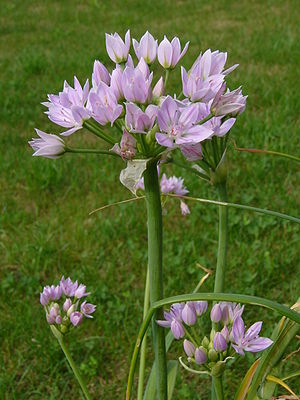Rose leek
| Rose leek | ||||||||||||
|---|---|---|---|---|---|---|---|---|---|---|---|---|

Rose leek ( Allium roseum ) |
||||||||||||
| Systematics | ||||||||||||
|
||||||||||||
| Scientific name | ||||||||||||
| Allium roseum | ||||||||||||
| L. |
The rose leek ( Allium roseum ) is a species of the genus leek ( Allium ).
features
The rose leek is a bare, perennial herbaceous plant . This geophyte forms onions as a persistence organ. The onion is about 1.5 centimeters thick, has a holey outer shell and many secondary onions. The two to four basal, simple, parallel- veined leaves are linear, flat, 12 to 35 centimeters long and 2 is 14 millimeters wide. The leaf margin is often finely serrated.
The round inflorescence stem reaches heights of growth of up to 80 centimeters, the lower fifth of which is covered by the leaves. The hemispherical, umbellate inflorescence has a diameter of 7 cm, consists of five to 30 flowers, sometimes forms bulbils and has a three- to four-lobed bract at the base . The flower stalks have a length of 7 to 45 millimeters. The upright, hermaphrodite, radial symmetry flowers are threefold and bell-shaped to cup-shaped. The six identical bloom bracts are usually pink, rarely white, and 7 to 12 millimeters long. The six stamens are shorter than the bracts; the anthers are yellow.
The flowering period extends from March to June.
There are fruit capsules formed.
The chromosome number is 2n = 16 or 32, but also 24, 40 or 48. For Allium roseum var. Tourneuxii it is 2n = 16.
Occurrence
The rose leek occurs in the Mediterranean area and on the Canary Islands on cultivated and wasteland as well as in garigues .
Systematics
One can distinguish the following subspecies and varieties:
- Allium roseum subsp. gulekense Koyuncu & Eker : It occurs in Turkey.
- Allium roseum subsp. roseum : It is originally found in the Mediterranean area, but is a neophyte in the Canaries, Madeira, Great Britain, the Czech Republic and New Zealand.
- Allium roseum var. Tourneuxii Boiss. (Syn .: Allium roseum subsp. Tourneuxii (Boiss.) Bartolo, Brullo, Pavone & Terrasi ): It occurs in Algeria, Tunisia, Libya, Egypt and Palestine.
use
Flowers, leaves and onions can be eaten raw or cooked.
photos
supporting documents
Individual evidence
- ^ Tropicos. [1]
- ↑ a b c d Rafaël Govaerts (Ed.): Allium - data sheet at World Checklist of Selected Plant Families of the Board of Trustees of the Royal Botanic Gardens, Kew. Last accessed on September 22, 2016.
- ↑ Entry in Plants for a Future. (engl.)
literature
- Ehrentraud Bayer, Karl-Peter Buttler , Xaver Finkenzeller, Jürke Grau: Plants of the Mediterranean (The Colored Nature Guide). Mosaik Verlag GmbH, Munich 1986.


